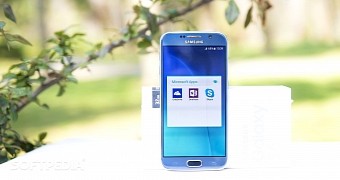In the last few months, Microsoft has surprised (and sometimes shocked) pretty much everyone with the attention it's paying to Android and iOS, despite the fact that it's still struggling to make Windows Phone a more competitive platform.
Recently, the company has signed a deal with Samsung to pre-install some of its flagship apps, including OneDrive, OneNote, and Skype, on the brand new Galaxy S6, which right now is the newest and the top Samsung model running Android.
The partnership was obviously a big hit for Microsoft, as the company still struggles to become a more relevant player in the mobile industry, but it turns out that, despite all these efforts, not everyone agrees to sell Android phones with pre-installed Microsoft software.
US carriers are now removing Microsoft's apps from the Galaxy S6, in an attempt to sell clean devices for their customers. Verizon and AT&T are both said to be doing that right now, and Microsoft has nothing to say about it. Only that it wants these apps on more Android devices as soon as possible.
New patent fees for phones with pre-installed software
In the meantime, Microsoft has found a way to make its apps available to more customers, hoping that, at some point, carriers would stop removing them from new phones.
It's believed that the software giant is now discussing with manufacturers to cut their patent fees for the Android phones they build if they decide to install Microsoft software, including OneNote, OneDrive, Office, and Skype, on these devices.
This is obviously a smart way to bring more Android devices running Microsoft apps to the market, as it's believed that the Redmond software firm owns patents used on some 90 percent of Android phones and tablets currently on the market.
Around $2 billion (€1.5 billion) are generated by Microsoft every year without moving a single finger.
"We know Android users want Microsoft apps"
One of the reasons the company wants to bring more apps on Android devices is that some of those who do not own a Microsoft phone or tablet still use a Windows-powered computer, so bringing them software that's already available on a PC directly on their mobile would be a way to make them more Microsoft-dependent.
"We want people to love the Windows devices, and I think with Windows 10, there’s a lot to love. But we also appreciate that people use iPhones, they may use Android tablets and then use a Windows PC," Brad Smith, Microsoft’s general counsel and executive vice president of legal and corporate affairs, has recently said in an interview with GeekWire.
In the end, it's all a very ambitious plan that could pay off if Microsoft plays its card right, but since the company is still new to this game, it could be a while until its software takes over Androids.

 14 DAY TRIAL //
14 DAY TRIAL //